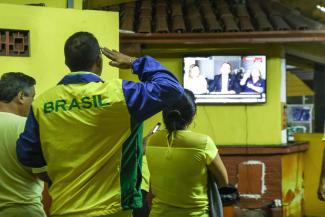Brazil
Blank cheque for the president

The figures come from the latest edition of Latinobarómetro, an annual opinion poll conducted in 18 Latin American countries. According to the pollsters, democracy is in crisis in other parts of Latin America too, but support for it as a form of government is weakest in Brazil. The British magazine The Economist attributes that primarily to economic concerns, followed by crime and corruption.
Brazil has recently been struggling with the worst recession for a hundred years. Unemployment is around 13%, and the 7.2% downturn in real gross domestic product in 2015 to 2016 was worse than what happens in a typical recession.
Bolsonaro’s victory is seen by many experts as a threat to democracy. However, the Latinobarómetro findings seem more to suggest that the former army captain was elected president precisely because Brazilian democracy is in trouble.
Bolsonaro evidently knew how to play on people’s fears in the election campaign. His campaign on social media focused on the three main causes of discontent: economy, crime and corruption. Now, Bolsonaro has appointed “superministers” vested with extended powers to stimulate the economy and combat crime and corruption: Paulo Guedes and Sérgio Moro (see my essay in focus section of D+C/E+Z e-Paper 2019/01).
Bolsonaro’s victory was thus no coincidence. He campaigned in an environment where politicians of various stripes had failed on many fronts – in terms of governance and systemic reform and in areas like security and the economy. There is talk of a “dysfunctional separation of powers” and a “judicialisation of politics”.
Whether the new administration is actually able to resolve the existing conflicts remains to be seen. Referring to far-right Bolsonaro’s flimsy election manifesto, Antônio Carlos Magalhães Neto, mayor of Salvador and president of the conservative DEM party, said: “In these elections, Brazil has handed over the biggest blank cheque in its history. No president has ever received a bigger blank cheque than Bolsonaro.”
There are 513 seats in the Chamber of Deputies and they are now occupied by representatives of 30 different parties. The opposition Workers’ Party (PT) has 56 seats and Bolsonaro’s PSL 52. The governing PSL thus holds 10% of the Chamber of Deputies and just five percent of the Senate (4 senators). For major projects like a pension reform, however, Bolsonaro needs the support of three-fifths of the Senate and Chamber of Deputies. That will certainly be a massive challenge.
What is more, the new Cabinet includes surprisingly few representatives of the big parties. Bolsonaro has created a Cabinet based on the two institutions that still enjoy the most confidence among voters: the armed forces and the churches.
According to polls, nearly a third of Brazilians think the risk of a military coup is particularly high at present. This is denied by the commander of the Brazilian army, General Eduardo Villas Bôas, who says the former army captain’s election as president does not mean “the military is back in power”.
Vladimir Safatle, a philosopher and professor at the University of São Paulo, sees mistakes on the left, where the political forces were divided and fought each other during the presidential election. Their infighting ultimately helped Bolsonaro to win. Defence of democracy will thus also depend on the progressive opposition’s ability to regroup.
The re-democratisation of Brazilian society will hinge crucially on relations between the executive and judiciary, says political scientist Sérgio Abranches. He also sees those relations as the ultimate test for the administration and democracy itself. Abranches reckons that Bolsonaro has about a year to show leadership and revive the economy – with governance and stability as the first challenge. Presidents who have frustrated voters in the past suffered an immediate loss of popularity and had problems in Congress. The political scientist recalls that two of them (Fernando Collor and Dilma Rousseff) were removed from office. No easy legacy for Bolsonaro.
Carlos Albuquerque works for the Brazilian programme of Deutsche Welle in Bonn.
carlos.albuquerque@gmx.de






